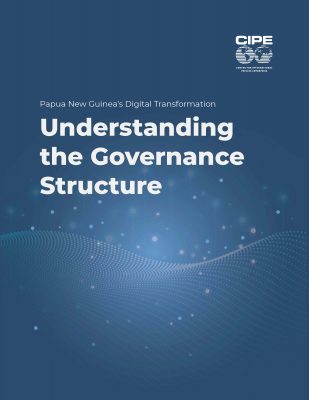 As the Pacific region is rapidly digitizing and embracing digital transformation, the newly available technology can empower Pacific citizens with greater access to information and networks. However, there is a lack of global and Pacific governance standards and norms on the digital economy and digital transformation. Digital governance encompasses the norms, institutions, and standards that shape the regulations around the development and use of digital technologies.
As the Pacific region is rapidly digitizing and embracing digital transformation, the newly available technology can empower Pacific citizens with greater access to information and networks. However, there is a lack of global and Pacific governance standards and norms on the digital economy and digital transformation. Digital governance encompasses the norms, institutions, and standards that shape the regulations around the development and use of digital technologies.
CIPE and the Foundation for Media Alternatives (FMA) analyze the relevant policies, regulations, and institutions concerning digital governance in Papua New Guinea (PNG) through a legal analysis and consultations with key PNG digital stakeholders. This report provides a baseline assessment and understanding of the current governance structure of PNG’s digital transformation and identifies key governance gaps and needs.
By establishing a baseline understanding of the current governance structure of PNG’s digital transformation, this report contributes to expanded opportunities for engaging the private sector in shaping digital governance that advances democratic values.
CIPE supports Pacific Islands partners to achieve a digital future with an open, secure, and reliable internet in which democracy delivers tangible benefits and the opportunity for all to prosper.
To learn more about CIPE’s digital governance work in the Pacific Island region, check out the resources highlighted below:
- Papua New Guinea’s Digital Transformation: Understanding Legal and Regulatory Challenges
- Understanding the Regulatory Environment for ICT Infrastructure in Papua New Guinea: A Case Study on the Integrated Government Information System (IGIS)
- Understanding the Regulatory Environment for ICT Infrastructure in Papua New Guinea: A Case Study of the Coral Sea Cable System
- Harnessing the Power of the Digital Economy (HPDE) Tok Pisin-English Digital Vocabulary Mini Dictionary
Published Date: February 26, 2024
